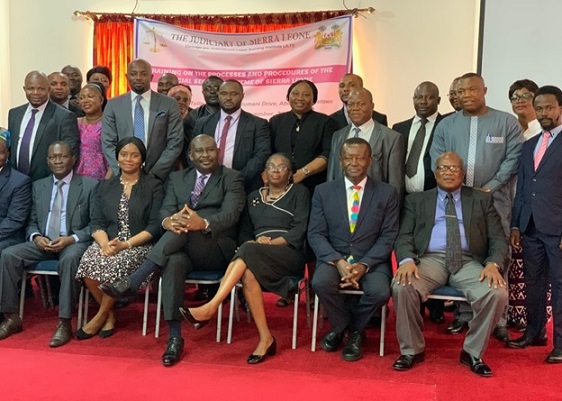The Judicial and Legal Training Institute (JLTI) of the Judiciary of Sierra Leone on Saturday 22nd November 2019, completed two days effective training on processes and procedures of the Social Security Scheme in Sierra Leone for judges, magistrates and support staff at Golden Tulip Hotel, Off Bintumani Drive, Aberdeen in Freetown.
Addressing judges, magistrates and judicial staff, the Chief Justice, Desmond Babatunde Edwards, said Section 131 subsection (3) of the 1991 Constitution of Sierra Leone gives him the power to establish additional divisions of the High Court of Sierra Leone, and that Constitutional Instrument No. 4 of 2019 has created eight divisions of the High Court among which is the Industrial and Social Security Division.
Chief Justice Edwards said judges, magistrates and judicial staff are trained in accordance with instrument 3 of the aforesaid Constitutional Instrument and that they will be working in the Industrial and Social Security Division with the aim to hear and determine labour, industrial relations and social security, industrial disputes, employer and employee relationships, trade dispute referred to the court by the Ministry responsible for Labour or a trade group council, failure to pay national social security and insurance scheme contributions, application and interpretation of the provision contained in National Social Security and Insurance Trust Act 2001, any other application for the recovery of debt owing as contribution or penalty through garnishee proceeding etc.
He said the underwriters of the scheme knew that workers may want to live glowing when they would have retired but also realized that some people will not be boarded to make their contributions and as a result of that, they have put in place mechanism to see to it that the social security contributions are recovered.
The Chief Justice noted that the Social Security Act makes provisions for legal actions to be taken should someone or institutions fail to meet their obligations.
He said the creation of the Industrial and Social Security Division of the High Court and the role of the Magistrate Courts revealed the strategic position of the Judiciary in ensuring that compliance to provisions in the act are enforced.
The Hon. Chief Justice said the eventual aim of the courts should not be putting defaulters behind bars, but to ensure that they recover monies that have not been paid which would have been paid.
The training dealt with several issues among them were offences under the NASSIT Act 2001, Act No. 5 of 2001 especially those common offences such as non-registration of employees as in section 30(1) and other offences under section 32(1).
It was noted at the workshop that these offences could be summarily tried at the Magistrate Courts.
On enforcement mechanisms, it was revealed during the training that judgement obtained against private institutions could be relatively easy to enforce as compare to government institutions and of which enforcement against government institution requires relevant notice under the State Proceedings Act 2000 in order for legal actions to be taken.
Making a brief statement, the President of the Industrial and Social Security Court, Hon. Justice Sengu M. Koroma (JSC) said industrial and social security offences as prescribed by the relevant Acts, have been handled by various judges and magistrates; but with the division, those judges and magistrates who were trained, will handle the cases expeditiously and accurately.
He said the Hon. Chief Justice had renovated the court close to the Bank of Sierra Leone and will be used for that purpose.
Several topics were dealt with such as the Legal framework of the Social Security Trust established by Act No. 5 of 2001, handled by Hon. Justice Sengu M. Koroma (JSC), Criminal Proceeding against Corporation was handled by the Hon. Justice N. C. Browne-Marke (JSC), Enforcement Mechanisms was handled by Hon. Justice John Bosco Allieu (JA) Human Rights, Social Security and Industrial Relations was handled by Hon. Jamesina King (JA), Judicial Ethics was handled by Hon. Justice Bintu Alhadi (J) etc.
Chief Justice to Run Effective Social Security Courts


